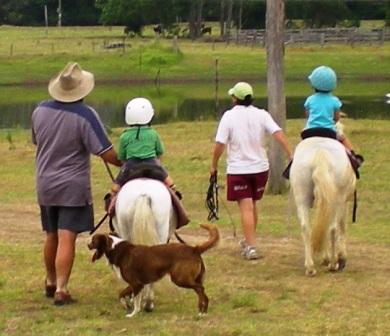Horsezone News
Horse Owners to Experience Shock Fallout from SA State Budget
Published on Monday, October 11, 2010 in General

non-commercial lifestyle properties, which may include pleasure ponies, will have no ability to recoup or claim back the proposed $165 fee on tax or business operations
Horse and livestock owners in South Australia are about to feel the fallout from the recent South Australian Government State Budget.
The Animal Health section is now preparing for the required legislative changes to enable a “Biosecurity Fee” to be collected on each property with livestock and horses. This fee, with early estimations being advised of $165 or more, is planned to be collected from January 2011. The monies, proposed to be collected annually, are to be used to cover the costs of providing the existing core Animal Health services, such as surveillance.
“The news of this fee has come as quite a shock” said Wendy Hunt, Chair of Equestrian SA “Whilst our organisation supports good biosecurity controls we believe that "creating fees" will not encourage property owners to do the right thing but instead avoid and deny that stock exist. Unfortunately these fees do not seem to have anything to do with biosecurity but seems to be just revenue raising for the Government.” It also raises moral, social and legal questions.
For a number of years, horse owners have been made aware of the impending introduction of a mandatory Property Identification Code (PIC) system. This is also set to be introduced from January 2011 and will incur its own administration fee for cost-recovery purposes. Individual horses are not identified, neither are existing brands or microchips linked to the PIC.
The PIC system is supported across animal industry groups, including horses, and seen as integral to supporting effective biosecurity and emergency responses. Many properties housing over 1100 horses have already voluntarily registered on the system over the last 5 years, which is currently free.
“The new PIC fee and the national Emergency Cost Sharing Agreement (EADRA) should not be confused with the new South Australian Government “Biosecurity Fee” said Helen Whittle, Chair of Horse SA “PIC and the new Biosecurity Fee are unrelated to the recent push to introduce voluntary vaccination for Equine Influenza; quite confusing for horse property owners to say the least”
EADRA is an agreement between the Federal & State Governments, other livestock groups and the horse industry in relation to how an emergency disease occurrence will be managed and a related cost-recovery mechanism. The horse industry has not yet signed EADRA but negotiations are now in the closing stages. The current proposal on the table is a levy mechanism to be applied to wormers and manufactured horse feed. A $0 levy is proposed, which is not enacted until after a disease response has been completed. Signing of EADRA is widely supported and has appropriate levels of industry & public consultation.
PIC and EADRA have had long lead-in periods and each has evidence of industry awareness, consultation and negotiation.
The “Biosecurity Fee” does not.
Required changes to the Livestock Act will apparently go to Parliament without public consultation in the coming months. There are no known planned independent socio-economic impact studies, cost-benefit analysis or other transparent “checks & balances” to be completed before the proposed January 2011 introduction.
Horse SA, in collaboration with state and national horse organisations, has a demonstrated history of promoting and supporting biosecurity planning including public education. Horses are valued as a part of our Australian society, as are the relationships between the horse community and other animal sectors which may have a higher commercial demographic.
Objection to the introduction of this fee relates to the lack of public consultation and opportunities for expert scrutiny and validation processes, not an attempt to reduce horse owner’s biosecurity responsibilities.
Mr Greg Bailey, President of Pony Club South Australia, is working collaboratively with community horse groups & industry representatives, including Horse SA & Equestrian SA, to seek a halt to legislative processes that will see the introduction of the proposed new fee.
“Further work needs to be undertaken to see if it is legal, that all other budget options have been exhausted and to give time for horse owners to be suitably informed” said Mr. Bailey “Moral & social impact questions need also to be addressed, as does the question of non-commercial lifestyle properties, which may include pleasure ponies, who have no ability to recoup or claim back fees on tax or business operations.”
“Effective biosecurity can only be implemented when all livestock and horse owners are engaged, not driven to hide numbers or species of animals in an attempt to avoid what is to date a combined fee of at least $240” concluded Helen Whittle.
Non compliance will incur a fine on discovery. With Budget Estimates and limited sitting days before Christmas a busy time is ensured for all.
Be the first to comment on this article
You must be logged in to place comments
News Search
Categories
- General
- Event Results
- Stallionzone
- Sponsored Shows
- Clubs
- Health
- Feature Horses
- Competitions
- Five Minutes With Horsezone
- Young Riders
- Reviews
- Training and Clinics
- Postcards from the saddle
- 2014 Equitana by HORSE FIRST
- 2013 Equitana
- 2012 Equitana
- 2012 London
- 2011 Equitana
- 2011 Queensland Floods
- 2010 WEG
